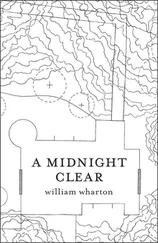
Table of Contents
Title Page WILLIAM WHARTON Dad
Dedication To the women in my life: Mother, sister, daughters, wife
Epigraph That man’s father is my father’s son — Second half of a riddle
Chapter 1
Chapter 2
Chapter 3
Chapter 4
Chapter 5
Chapter 6
Chapter 7
Chapter 8
Chapter 9
Chapter 10
Chapter 11
Chapter 12
Chapter 13
Chapter 14
Chapter 15
Chapter 16
Chapter 17
Chapter 18
Chapter 19
Chapter 20
Chapter 21
Chapter 22
Chapter 23
Also by William Wharton
Copyright
About the Publisher
To the women in my life:
Mother, sister, daughters, wife
That man’s father
is my father’s son
— Second half of a riddle
AAA CON is the first name in the phone book of most large American cities. This outfit arranges drive-aways; searches out people to drive cars for delivery from one place to another.
My son Billy and I are waiting in the L.A. AAA CON office. I’ve had my medical exam, deposited a fifty-dollar bond, filled out forms and given references. Billy’s too young to take a drive-away; the minimum age is twenty-one. A car’s already been assigned to us and we’re waiting now for them to drive it up.
Billy’s excited because it’s a Lincoln Continental. I dread telling him he isn’t going to drive. I’m not a super-responsible person, but I’m that responsible, especially with someone else’s fifteen-thousand-dollar automobile.
So I’ll be driving all the way across this huge country and I’m not looking forward to it.
The office here is grim. These places are only processing centers; nothing’s spent on carpets or fancy furnishings. I figure they make a hundred bucks or so on each car they move cross-country.
Finally, the beefy fellow at the desk calls us over. He asks what route we want and agrees to 15–70–76. It’s the least trafficked by trucks because of the high, unfinished pass at Loveland. After that, it’s double-four most of the way.
We’ll be delivering this car to Philadelphia, my old hometown, then we’ll take a plane to Paris. Paris is our real home now, has been for fifteen years.
Half an hour later we get the car. It isn’t new, maybe two years old, deep maroon with a black vinyl top; flashy-looking affair; looks like a gangster’s car. We’re delivering to somebody named Scarlietti, so who knows, maybe we’re driving a bump-off car.
This must be the twentieth time I’ve driven cross-country; more than half those trips Drive-Away.
One time we moved a pale yellow Chevy Impala convertible. That was in the days of convertibles, before air conditioning and stereo. We tied our kids in that car with jump ropes so they couldn’t fall out, then zoomed west to east mostly on 66, top down, wind, sun in our faces. The kids could fight, scream, play, holler, make all the noise they wanted; we couldn’t hear a thing. It was almost like a honeymoon for Vron and me.
We got good mileage on that Chevy, too. But this Lincoln’s going to put me down an extra thirty bucks in gas. At least we’ll be comfortable; it’s no joke beating a car three thousand miles across the whole damned country in eight days, and I’m getting too old for this kind of thing.
The part I’ve been dreading comes after we pull out with the Lincoln. We need to pick up our bags and say goodbye to Mom. Billy’s jumpy too. We know it won’t be easy; nothing’s easy with Mom; but considering all that’s happened this is going to be especially hard.
We ease our giant floating dark red boat up Colby Lane. A car like this isn’t designed to move around narrow, old-fashioned residential streets. Dad bought the lot here for twenty-six hundred dollars about twenty-five years ago. He built the house himself at a total cost under six thousand bucks; it must be worth over eighty thousand today.
We park on the driveway and go inside. Mom’s dressed to kill, looking damned good for someone who’s had two heart attacks in the past five months. Still, she’s weepy around the eyes, pale; walking with her new peculiar shuffle. It’s as if she has a load in her pants and is balancing a book on her head.
She starts straight off crying, asking what she’s going to do when I leave; insisting she’ll be all alone, because, according to her, Joan, my sister, doesn’t care if she lives or dies.
I’ve been listening to Mom complaining all my life, especially during the last months. I keep thinking I’ll get immune to it; I should be thoroughly inoculated after fifty years, but sometimes it still hurts. Sometimes I really listen and sometimes I can’t take it anymore. This time I’m only numb.
I wait until she slows down. I tell her again how some things must be. I need to go home. It’s been too long since I’ve seen Vron and Jacky. I can’t spend the rest of my life taking care of her and Dad. She knows all this, we’ve been over it enough.
Billy stands in the background listening. He starts turning television channels, looking for something, anything. I can’t blame him. Mom keeps at it. I’m nodding my head as I work our bags to the car. She’s also pushing a child’s lunch box filled with pills on us. It’s her way of showing love, taking care, making us feel dependent.
But we do finally get away.
The next part’s even tougher. We cruise up Colby to the convalescent home where Dad is. The home is only a block from my parents’ house. We chose it so Mom could be near. We experimented with another place but settled on this one. It has its limitations but Mom can walk here when she wants. It probably isn’t good for Dad but nobody can deny her this.
We park around the corner and go in. The smell is something I’ll never get used to. It’s a combination of the smells in a men’s room and an animal shelter. When I was sixteen, I worked for a small-animal vet. I’d come in mornings and hose down the cages, wash out all the dog and cat crap from the night before. This is a combination of those smells, plus the smell of general decrepitude.
I never knew what the word decrepitude or corruption really meant. As kids, we used to say piss, shit and corruption. Now I know. Corruption is when something is being corrupted; rotted by bacteria. These poor, old people here are being corrupted, rotted, decayed. The result is decrepitude, being wasted, worn out, used up.
Smells like this are hard to cover. All the carbolic acid, strong soap and aerosol in the world won’t do it. This is the smell of death, the going back to earth none of us can avoid.
A German-born brother and sister run the home. People couldn’t be kinder. Of course, they’re doing it for money, lots of money. The cheapest you can have a shared double is twenty-five bucks a day. But I wouldn’t do it, night and day, day in and day out. I couldn’t.
They tell me Dad’s still in the same room but they don’t think he’ll know us; he’s under sedation. I’ve accepted this; sedation is the best thing for him now, anything to make it easy. There don’t seem to be any real, practical, permanent answers. There’s no room for him in this world anymore. I know something about old age now. You’re old when most people would rather have you dead.
We walk along the hallway looking into rooms. We peek in at thin, worn shells of human beings; people with oxygen tubes on their noses and catheters coming out from under bathrobes. They’re propped up in bed or sitting in wheelchairs. It’s only afternoon, but they’re all dressed in bed clothes. Some are hunched over, listening to radios or staring at television sets; mouths open, mostly toothless. As we go by, some look out, latch on to us with their eyes, like prisoners peering from cells. I feel guiltily healthy, young, with an unending future. How must Billy, beside me, feel at nineteen?
Читать дальше













